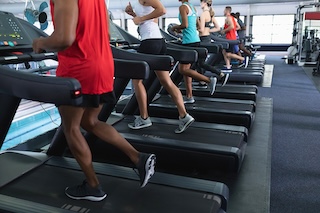April 1, 2025
by Patricia Tomasi

A new study published in PLOS One looked at women’s body image and experiences of exercising in gym settings. “Our study explores the experiences of women who exercise in gyms, focusing on the barriers they face, including issues related to body image and harassment,” study author Emma Cowley told us. Cowley works at the SHE Research Centre, Department of Sport and Health Sciences, Technological University of the Shannon in Athlone, Ireland. “We aimed to understand how gym environments impact women’s confidence, comfort, and ability to fully engage in exercise.”
[More]
March 28, 2025
by Elizabeth Pratt

Those experiencing an eating disorder are more harshly judged than those with other mental health conditions.
Research from the University of South Australia found the social stigma associated with eating disorders could make it harder for people to seek help.
[More]
September 17, 2024
by Patricia Tomasi

A new study published in PLOS ONE looked at the impact of pro-ana TikTok content on body image dissatisfaction and internalization of societal beauty standards. “The relationship between body image dissatisfaction, disordered eating behaviours and social media platforms, such as Instagram and Twitter, has been well documented,” study author Madison R. Blackburn told us. “The unique TikTok algorithm is more influential than the choices of individual users in determining the content they see on their ‘For You’ page.”
[More]
July 30, 2024
by Elizabeth Pratt

Digital self harm is on the rise among adolescents in the United States.
Research published in the Journal of School violence found that digital self-harm among teenagers has increased by 88% since 2016.
[More]
November 30, 2023
by Elizabeth Pratt

Women experience a large variation in perceptions of their own body during pregnancy.
Research published in BMC Pregnancy and Childbirth found that average levels of body image dissatisfaction was similar in pregnant and non-pregnant, but there were significant differences between individuals.
[More]
August 31, 2023
by Elizabeth Pratt

If you spend time browsing for activewear online, you may want to think again.
Research recently published in the International Journal of Consumer studies found that women have reduced self-esteem after online shopping for activewear.
[More]
September 30, 2022
by Elizabeth Pratt

50% of people who are pregnant or postpartum report feeling dissatisfied with their bodies.
A small survey of 161 women aged between 18 and 45 who were either pregnant or postpartum found that more than half were unhappy with how they looked either during or following pregnancy.
[More]
September 29, 2022
by Elizabeth Pratt

Two in three parents report that their children feel self-conscious about their appearance.
A national poll found that one in five parents report their teens avoid some activities due to their insecurities and one in three parents report their kids have been treated unkindly due to their appearance.
[More]
December 28, 2021
by Patricia Tomasi

Two new studies published in the Journal of Biological Psychiatry and BioRxiv focused on understanding how the frontal part of the cortex known as the prefrontal cortex (PFC) develops. “We were interested in studying this regions as it is important for higher order cognition (think problem solving, planning complex actitivies), regulating emotion and social behaviors, which are most advanced in humans and behaviors disrupted in most neuropsychiatric disorder,” studies author Kartik Pattabiraman told us. “Furthermore, the PFC is greatly expanded in primates and are further specialized i.e. unique connections and cellular properties in humans. For example, excitatory neurons in human PFC form more connections with other neurons than neurons in monkeys and other animals.”
[More]
May 18, 2021
by Patricia Tomasi

A new study published in the Journal of Body Image looked at the effect playing with ultra-thin dolls has on the way young girls view their own bodies. “We were interested in understanding whether doll play would influence girls’ developing sense of an ‘ideal’ body,” study author Lynda Boothroyd, a professor in the Department of Psychology at Durham University in the UK told us.
[More]